
The Denver & Rio Grande Western Railroad, often shortened to Rio Grande, D&RG or D&RGW, formerly the Denver & Rio Grande Railroad, was an American Class I railroad company. The railroad started as a 3 ft narrow-gauge line running south from Denver, Colorado in 1870. It served mainly as a transcontinental bridge line between Denver, and Salt Lake City, Utah. The Rio Grande was also a major origin of coal and mineral traffic.

Montrose is the Home Rule Municipality that is the county seat and the most populous municipality of Montrose County, Colorado, United States. The city population was 19,132 at the 2010 United States Census. The main road that leads in and out of Montrose is U.S. Highway 50. The town is located in cardinal-western Colorado, in the upper Uncompahgre Valley and is an economic, labor, and transportation waypoint for the surrounding recreation industry. Demographically, the town is majority white, with a large Hispanic population. It is also the home of a few major engineering projects, namely the Gunnison Tunnel.

The Denver, South Park, and Pacific Railroad was a historic 3 ft narrow gauge railroad that operated in Colorado in the western United States in the late 19th century. The railroad opened up the first rail routes to a large section of the central Colorado mining district in the decades of the mineral boom. The railroad took its name from the fact that its main line from Denver ascended the Platte Canyon and traversed South Park. Founded in 1872 by Colorado Governor John Evans, the company was purchased by the Union Pacific Railway in 1880, though it continued to be operated independently. The line went bankrupt in 1889 and was reorganized under the new moniker the Denver, Leadville and Gunnison Railway. When the Union Pacific went bankrupt in 1893, the DL&G lines went into receivership and were eventually sold to the Colorado and Southern Railway. In the first half of the 20th century, nearly all the company's original lines were dismantled or converted into 4 ft 8 1⁄2 instandard gauge. The last train to run the old DSP&P tracks was from Como, Colorado on April 11, 1937. A section of the standard gauge line between Leadville and Climax is still operated as a passenger excursion railroad called the Leadville, Colorado and Southern Railroad. At its peak the Denver, South Park and Pacific Railroad had 335 miles (539 km) of narrow gauge line, making it the largest narrow gauge railroad in the state of Colorado.
Alpine Tunnel is a 1,772 ft (540 m) narrow gauge railroad tunnel located east of Pitkin, Colorado on the former Denver, South Park and Pacific Railroad route from Denver to Gunnison. At an elevation of 11,523 feet (3,512 m), it was the first tunnel constructed through the Continental Divide in Colorado, and according to the U.S. Forest Service "remains the highest railroad tunnel and the longest narrow gauge tunnel in North America." However, it did not last long in service. Construction began in January 1880 and was scheduled to last for six months but instead dragged on until July 1882, and the line was abandoned in 1910 due to minor damage in the tunnel. Now the tunnel is sealed shut and the remaining trackbed serves as a trail for hikers and off-road vehicles.
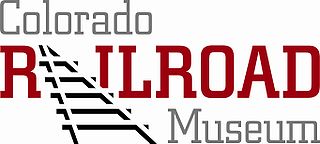
The Colorado Railroad Museum is a non-profit railroad museum. The museum is located on 15 acres (6.1 ha) at a point where Clear Creek flows between North and South Table Mountains in Golden, Colorado.

There are more than 1,500 properties and historic districts in Colorado listed on the National Register of Historic Places. They are distributed over 63 of Colorado's 64 counties; only Broomfield County has none.

David Halliday Moffat was an American financier and industrialist.
The Shavano (train), named for nearby Mount Shavano, was operated by the Denver and Rio Grande Railroad. The passenger train ran between Salida and Gunnison, Colorado on the railroad's historic narrow gauge route over Marshall Pass. The Shavano operated as Train #315 westbound, and #316 eastbound.

Embudo is an unincorporated community in Rio Arriba County, New Mexico, United States. It is on NM State Road 68. The Embudo Station is located 2.9 miles south of the intersection of NM State Road 75, near where the Embudo River flows into the Rio Grande.

Pueblo Union Depot is the historic railroad station in Pueblo, Colorado. It was built in the Richardsonian Romanesque style in 1889-1890 and added to the National Register of Historic Places in 1975.
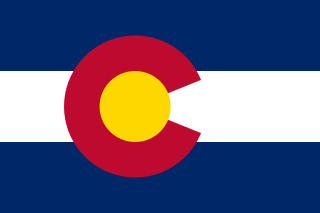
The following outline is provided as an overview of and topical guide to the U.S. state of Colorado:
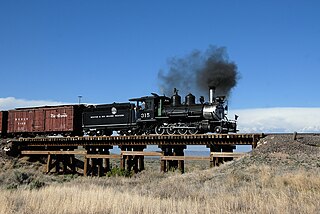
Denver and Rio Grande Western No. 315 is a Class C-18 2-8-0 Consolidation type, narrow gauge steam railway locomotive that was originally built for the Florence and Cripple Creek Railroad by Baldwin Locomotive Works in 1868. On the F&CC it was number 3, named Elkton. After the demise of the F&CC in 1915, the locomotive sat unused until the Denver and Rio Grande purchased it and four of its sisters in 1917 to help with war traffic. In D&RG service it became No. 425, but was renumbered No. 315 when the D&RG became the Denver and Rio Grande Western in the reorganization of 1924. It began its D&RG service at Alamosa, Colorado, was leased to the Rio Grande Southern for 1926-27 and then spent most of the next decade on the Gunnison Division, in Salida, Colorado, on the line to Montrose and on the branch to Ouray.

Denver and Rio Grande Western No. 168 is a 4-6-0 “Ten Wheeler” type narrow gauge steam railway locomotive. It is one of twelve similar locomotives built for the Denver and Rio Grande Railroad by Baldwin Locomotive Works in 1883. It was built as a passenger locomotive, with 46 in (1,200 mm) drivers, the largest drivers used on any three foot gauge D&RGW locomotive. The large drivers made it suitable for relatively fast passenger service.
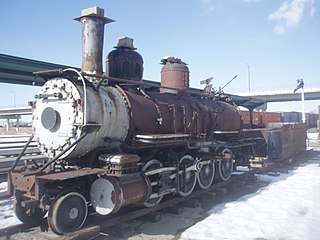
Denver and Rio Grande Western 223 is a 2-8-0 Consolidation type narrow gauge steam railway locomotive built for the Denver and Rio Grande Railroad by the Grant Locomotive Works of Paterson, New Jersey in 1881-82. Number 223 was completed in December 1881, at a cost of $11,553. Baldwin built an additional 25 locomotives in the same class at the same time.

Limon Railroad Depot was a major Union Pacific and Chicago, Rock Island and Pacific Railroad station in Limon, Colorado. It has been on the National Register of Historical Places since 2003. It is included in what is now the Limon Heritage Museum and Railroad Park. It is one of seven still standing Rock Island Line stations in Colorado, and the only one restored.

The Denver and Rio Grande Western Depot, commonly referred to as the Rio Grande Depot, is a former train station on the western edge of Downtown Salt Lake City.
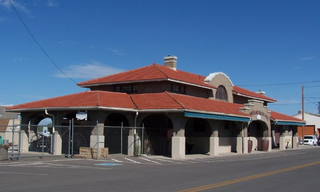
The Montrose County Historical Museum is located in Montrose, Colorado, USA, founded in 1973 by the Montrose County Historical Society. The society's mission is to preserve, display and interpret the historic and cultural legacy of Montrose County and its surrounding region. Its building, the Denver and Rio Grande Depot, is listed on the National Register of Historic Places.

The Denver and Rio Grande Western Railway Depot in Aztec, New Mexico, is located at 314 Rio Grande. It was built in 1915 in Prairie School style. It was listed on the National Register of Historic Places in 1985.

The Steamboat Springs Depot, at 39265 Routt County Rd. 33B in Steamboat Springs, Colorado, was built in 1909. It was listed on the National Register of Historic Places in 1978.

The La Jara Depot, at Broadway and Main Sts. in La Jara, Colorado, was built in 1911. It was listed on the National Register of Historic Places in 1975.




















